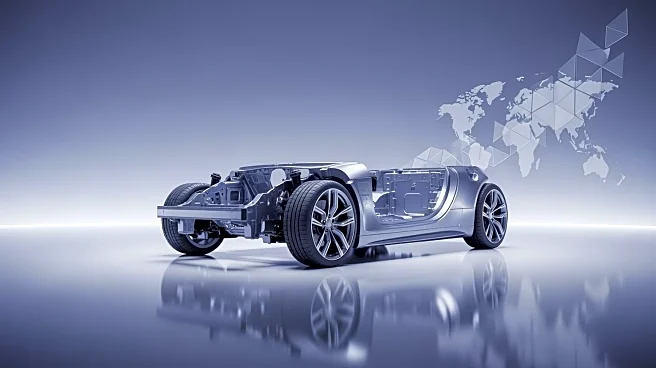What's Happening?
Slovakia, known as 'Europe's Detroit' due to its significant automotive production, is facing multiple challenges that threaten its status as a leading car manufacturer. The country's automotive industry, which accounts for 11% of its GDP and a substantial
portion of its employment, is under pressure from U.S. tariffs, Chinese competition, and domestic tax increases. U.S. tariffs, imposed by President Trump's administration, have been identified as a major risk, with Slovakia's exports to the U.S. heavily reliant on the automotive sector. Additionally, geopolitical shifts, including Slovakia's government stance towards Russia, are creating strategic risks for the industry.
Why It's Important?
The challenges facing Slovakia's automotive sector have significant implications for the country's economy and its position in the global market. The U.S. tariffs could lead to reduced demand for Slovakian cars in the U.S., impacting revenue and employment. Furthermore, the geopolitical stance of Slovakia's government may affect its relationships with EU partners, potentially influencing investment decisions. The lack of targeted support for the transition to electric vehicles further complicates the industry's future, as global competition intensifies.
What's Next?
Slovakia's automotive industry may need to adapt to the changing global landscape by seeking new markets and enhancing competitiveness. The government's fiscal policies and geopolitical strategies will play a crucial role in shaping the industry's future. Stakeholders may push for more supportive measures to facilitate the transition to electric vehicles and mitigate the impact of tariffs. The ongoing geopolitical tensions could lead to further protests and political pressure on the government to reconsider its stance.
Beyond the Headlines
The situation in Slovakia highlights broader issues of economic dependency and geopolitical influence in Central Europe. The automotive sector's reliance on exports to the U.S. underscores the vulnerability of economies to international trade policies. Additionally, Slovakia's political alignment and its impact on EU relations may serve as a case study for other nations navigating similar challenges. The industry's struggle with electrification reflects the global shift towards sustainable practices and the need for strategic planning in response to environmental and market demands.















